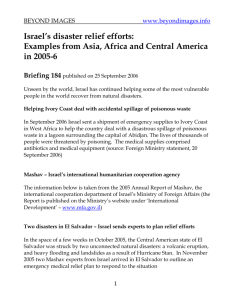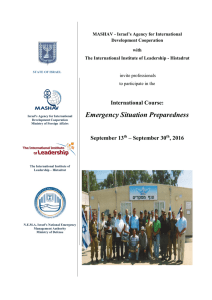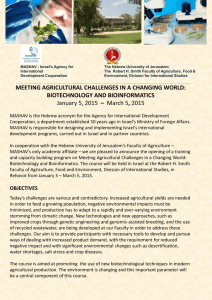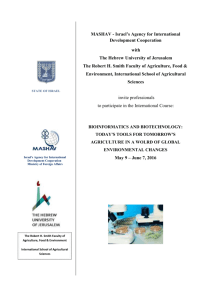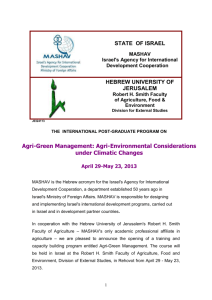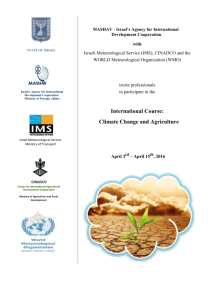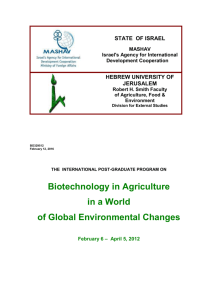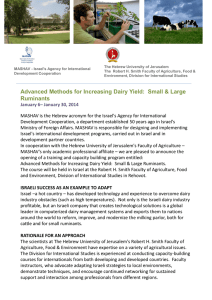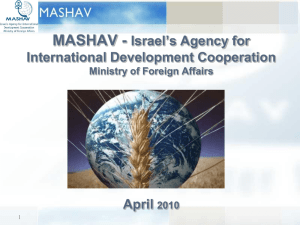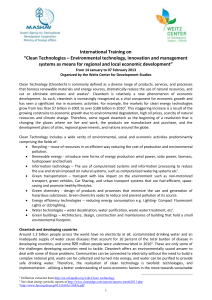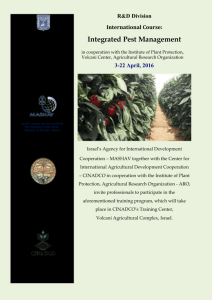Municipal Platforms for Local Strategic Development
advertisement
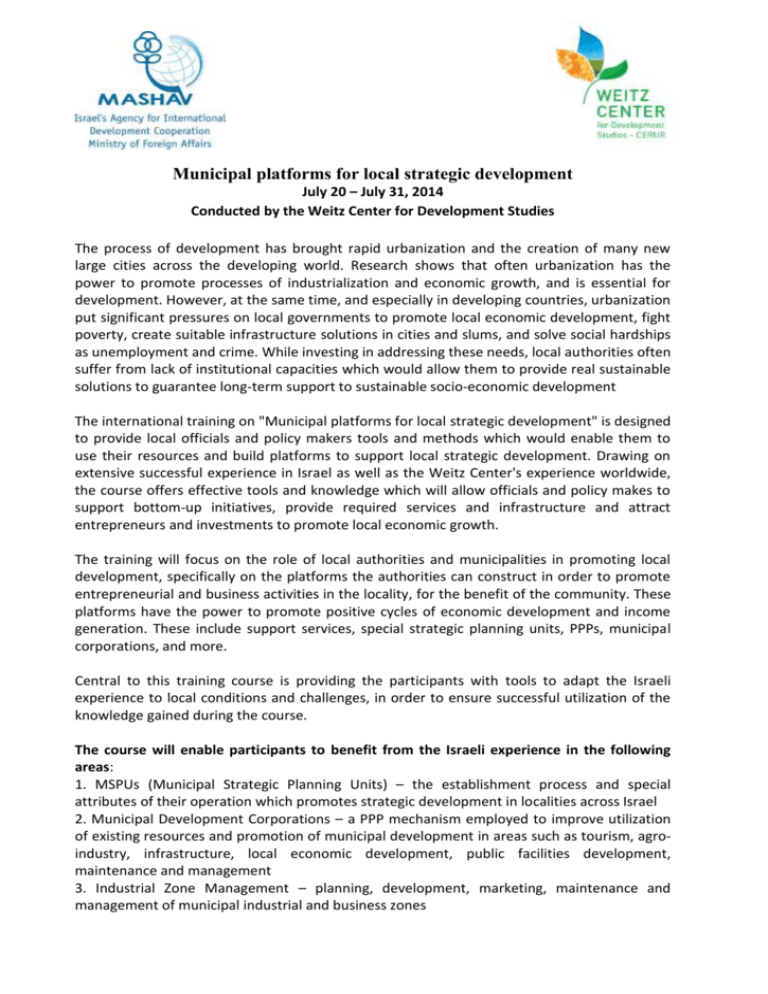
Municipal platforms for local strategic development July 20 – July 31, 2014 Conducted by the Weitz Center for Development Studies The process of development has brought rapid urbanization and the creation of many new large cities across the developing world. Research shows that often urbanization has the power to promote processes of industrialization and economic growth, and is essential for development. However, at the same time, and especially in developing countries, urbanization put significant pressures on local governments to promote local economic development, fight poverty, create suitable infrastructure solutions in cities and slums, and solve social hardships as unemployment and crime. While investing in addressing these needs, local authorities often suffer from lack of institutional capacities which would allow them to provide real sustainable solutions to guarantee long-term support to sustainable socio-economic development The international training on "Municipal platforms for local strategic development" is designed to provide local officials and policy makers tools and methods which would enable them to use their resources and build platforms to support local strategic development. Drawing on extensive successful experience in Israel as well as the Weitz Center's experience worldwide, the course offers effective tools and knowledge which will allow officials and policy makes to support bottom-up initiatives, provide required services and infrastructure and attract entrepreneurs and investments to promote local economic growth. The training will focus on the role of local authorities and municipalities in promoting local development, specifically on the platforms the authorities can construct in order to promote entrepreneurial and business activities in the locality, for the benefit of the community. These platforms have the power to promote positive cycles of economic development and income generation. These include support services, special strategic planning units, PPPs, municipal corporations, and more. Central to this training course is providing the participants with tools to adapt the Israeli experience to local conditions and challenges, in order to ensure successful utilization of the knowledge gained during the course. The course will enable participants to benefit from the Israeli experience in the following areas: 1. MSPUs (Municipal Strategic Planning Units) – the establishment process and special attributes of their operation which promotes strategic development in localities across Israel 2. Municipal Development Corporations – a PPP mechanism employed to improve utilization of existing resources and promotion of municipal development in areas such as tourism, agroindustry, infrastructure, local economic development, public facilities development, maintenance and management 3. Industrial Zone Management – planning, development, marketing, maintenance and management of municipal industrial and business zones 4. Municipal Branding – as a complementary strategic development mechanism to attract resources, people and activities 5. Jobs and income generating support centers – local and regional institutions supporting the establishment and survival of SMEs and local employment programs 6. Municipal water companies - water and wastewater infrastructure and management conducted by companies linked to municipalities 7. Platforms for cooperation among local authorities for better service delivery and exchange of knowledge and experience The training course will provide participants with knowledge and tools regarding • The legal frameworks of these mechanisms • PPP opportunities and financial aspects • Modes of operation and working patterns • The relations between the mechanisms and the local authorities and other stakeholders, The training involves presentations, workshops, discussions, field trips and meetings with professionals and decision makers. The training also involves personal assignments and exercises. Remark: Please take into consideration that the program involves daily walking on the campus as well as in field visits. Who may apply? The training targets planners, architects, engineers, economists, community workers, administrators and policy makers working in government ministries (such as local government, housing, development, welfare, health and others), in local authorities, NGOs and CBOs active in the field, as well as business organizations and academic institutions engaged with urban planning and municipal management. Application Process Candidates must complete the appropriate application forms (including health certificate, declaration etc.) available at the Israeli diplomatic mission in their country, or through the Internet http://mashav.mfa.gov.il, www.weitz-center.org. The completed forms should be submitted at the Israeli mission in your area and sent as a Word Document attachment to our office (ronit@weitz-center.org) not later than May 23rd, 2014. Candidates must also hand in a passport photo by electronic file. Scholarships The scholarships includes: 25 days with full board, tuition, accommodation (two participants in a double room) and meals, medical insurance (not included dental services, eye glasses, chronic illnesses and pregnancy) and transportation from/to the airport in Israel. The scholarship does not include airfare or transportation costs from participants’ home to Israel. It should be taken into account when booking the flight tickets that the scholarship covers exclusively from July 21 (arrival day) to August 14 (day of departure). Any liability or expense out of this term shall be entirely at the expense of the participant. Arrival and transportation A Taxi Company called “MONI SITON TOURS” will transport the participants to the Residence in Rehovot, Israel, where the students will stay during the training. Transportation will be free of charge only if transported by this company . The MONI SITON TOURS counter is located after passing through Customs, in the gallery of level 1 (Arriving Passengers’ hall, left staircase near gate 2, towards "Arbel Launch".) Medical Insurance MASHAV will provide a medical insurance for the participants for the duration of the course. It excludes dental care, pregnancy, eyeglasses and chronic illnesses. MASHAV and Weitz Center are not responsible in case of lost or stolen personal belongings. About MASHAV MASHAV – Israel’s Agency for International Development Cooperation - at Israel’s Ministry of Foreign Affairs was founded in late 1957, and is responsible for the design, coordination and implementation of the Sate of Israel’s development cooperation programs. MASHAV concentrates on human and institutional capacity building by sharing Israel’s own development experience and expertise, imparting know-how and transferring innovative technologies and tested methodologies adaptable to developing country needs. MASHAV’s approach is to ensure social, economic and environmental sustainable development, joining the international community's efforts to implement the Millennium Development Goals by 2015. In events of natural disasters, MASHAV also provides humanitarian assistance and participates in reconstruction and rehabilitation efforts. About Weitz Center The Weitz Center for Development Studies is a leader in capacity building for sustainable development. Our work is dedicated to enhancing the efforts of international agencies, governments, communities, civil society and private sector organizations to achieve positive social and economic change worldwide. Towards this end, we offer high quality training and consulting services, highlighting our practical, assets-based and integrated approach to development. http://www.weitz-center.org/ Additional Information Any additional information is available at: Weitz Center for Development Studies Mrs. Ronit Shpindel P.O.Box 12 Rehovot 76100, Israel Tel: 972-8-9474111 Fax: 972-8-9475884 Cell: 972-54-6655233 E-mail: ronit@weitz-center.org E-mail: ronitshp@netvision.net.il
